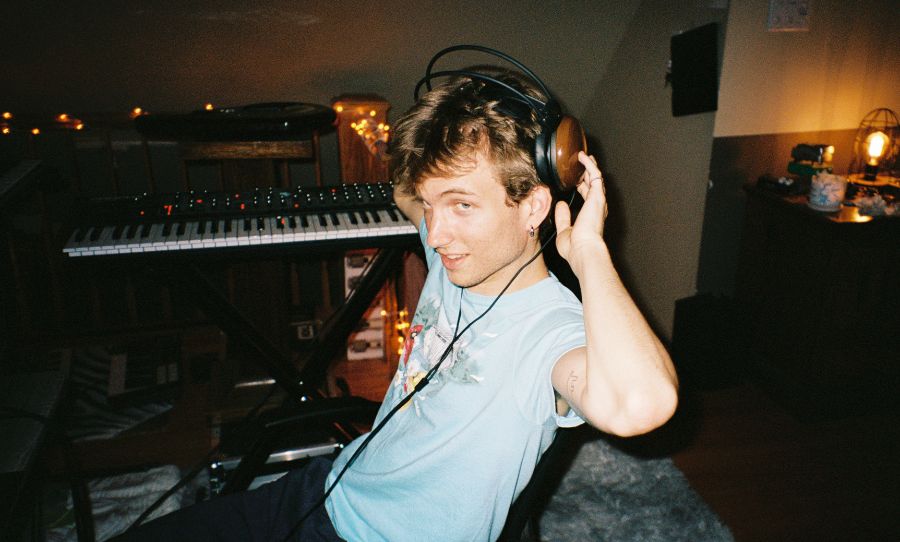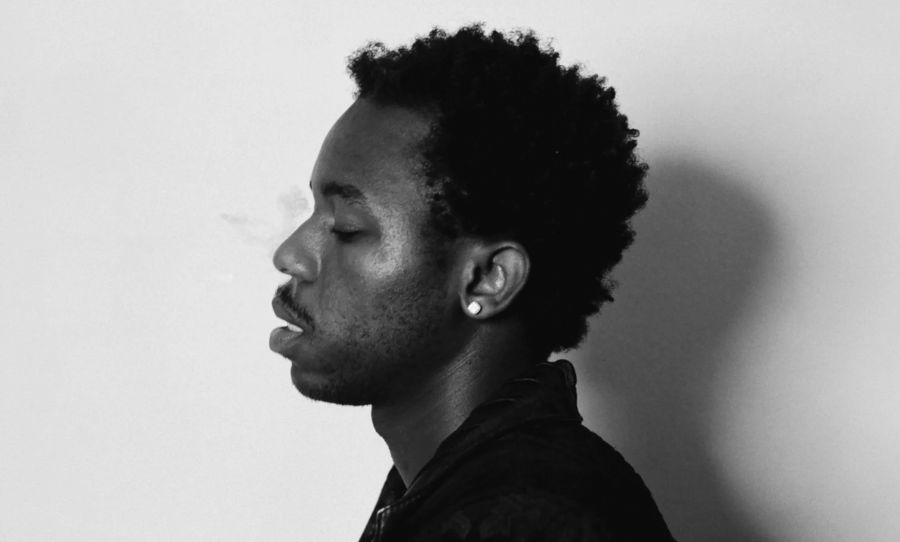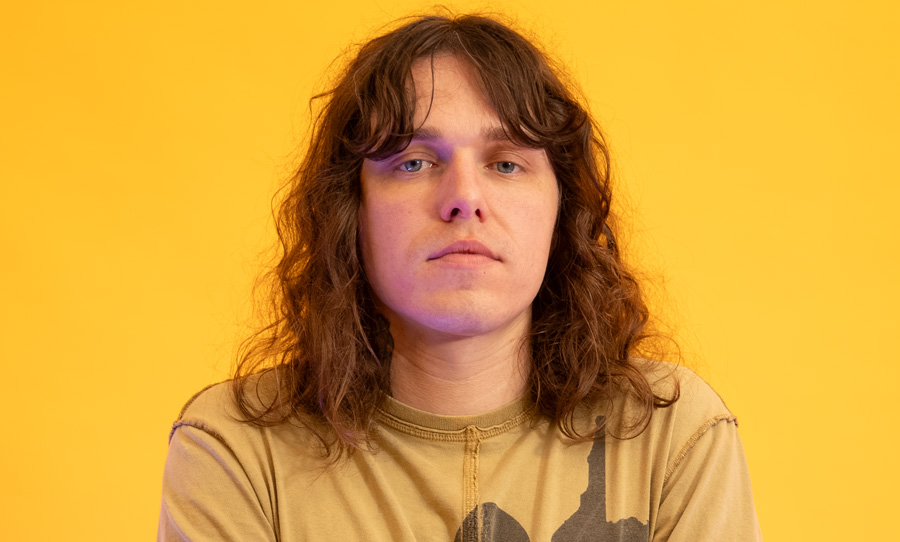Exploring Eye Candy’s enchanting music journey with frontman Aidan and his latest single ‘Microwave.’
After the recent launch of his sixth single, ‘Microwave,’ a delightful fusion that will set you dancing with carefree abandon in its indie pop allure, we sat down with Eye Candy’s frontman, Aidan, to explore his captivating musical odyssey.
Originally hailing from Chicago and now residing in Brooklyn, Eye Candy has found his musical haven in the vibrant NYC scene. His passion for music began early, influenced by iconic bands like Sabbath, Rage, and the Clash. Nirvana played a fundamental role in shaping his perception of music.
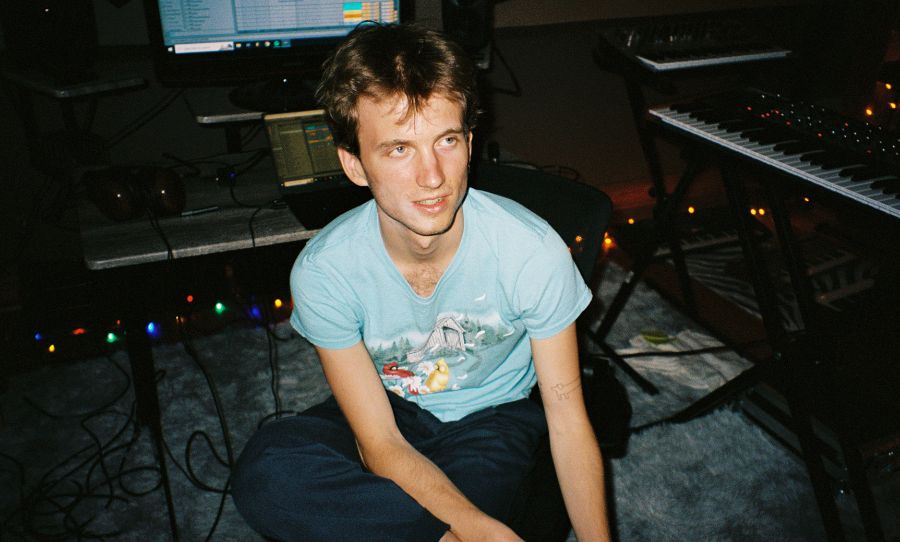
From being part of the Boston Alternative-Psych trio Sugar John to embracing solo recording, Eye Candy found his voice and evolved into an expressive and confident vocalist.
The Eye Candy EP laid the foundation for his hazy, cinematic soundscapes, setting the tone for dreamy, wonky pop vibes. Working alone at his home studio, he delves into sound textures and aesthetics, crafting distinct and organic music.
Collaborations with cinematographer Liam Mahoney and Max Hurley for cover art and photography create a mesmerising and singular universe.
Influenced by the likes of Brian Jonestown Massacre and Galaxie 500, his latest single, “Pigeon,” infuses guitar-based flavours and a candy-fied version of organic psychedelia. Eye Candy’s music draws inspiration from classic Shoegaze bands like My Bloody Valentine and Slowdive, as well as the expressive freedom of modern hip-hop.
Eye Candy’s artistic identity thrives on imperfection, pushing boundaries with chaotic saccharine takes on digital Pop music. His go-to gear includes Ableton Live, an essential tool in crafting intricate arrangements and manipulating sounds.
So, what makes Eye Candy happy? It’s the simple pleasures of life – sleeping, dreaming, laughing, crying, playing, and loving. Eye Candy’s musical journey is an enchanting voyage into a world of beauty and expressiveness. Get ready to be entranced!
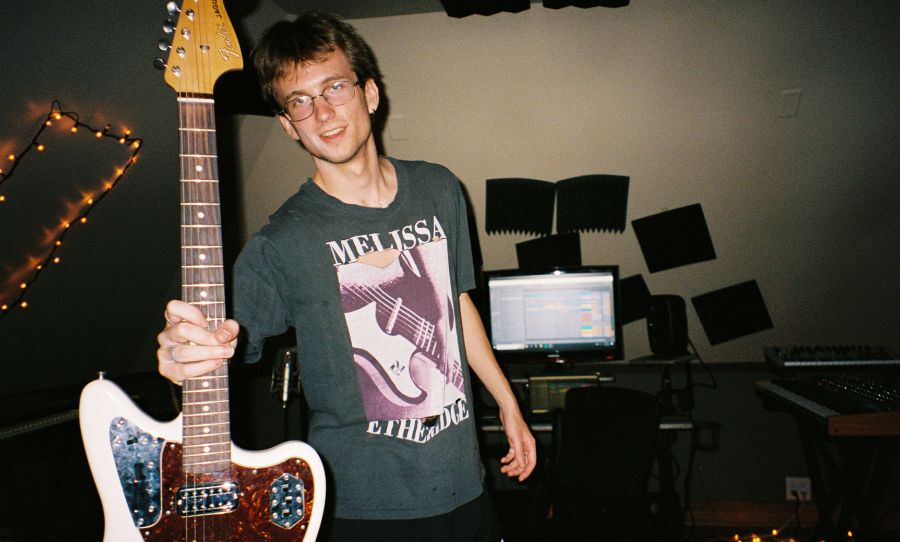
Happy: What are you up to today?
Eye Candy: Slept in, listened back to an ambient jam my friends and I recorded last night, and got a tattoo touch-up from a friend… seeing Oppenhemier tonight.
Happy: Tell us about where you are from? What’s the music scene like in your neck of the woods?
Eye Candy: I was in Chicago for the last two years, but I just moved to Brooklyn. Historically I have not engaged much with my “scene” out of a combination of cynicism and insecurity.
But I’m feeling really excited about being part of the NYC scene–this feels like the exact right place for my music.
Happy: Describe an average day?
Eye Candy: Wake up, daydream about Eye Candy while performing money making activities, take a walk, work on new Eye Candy, decide I’m the worst musician ever, decide I’m the best musician ever, sleepy.
Happy: What about your ultimate day?
Eye Candy: Goof off outside all day with my friends and spend the night with a beautiful woman. And maybe I just finished a good song the previous night so for 24 hours I am not haunted by the existential dread of not fulfilling my musical aspirations.
Happy: What did you listen to growing up that fuelled your passion for music?
Eye Candy: Some of my happiest early memories are of listening to music in the car with my Dad and brother. I was in a booster seat rocking out to Sabbath, Rage, and the Clash.
Nirvana was like my fundamental idea of what music was. Having a Dad who shared all of the coolest stuff with us definitely tapped us into the pure beauty of music from day one and predestined us for obsession–my brother’s middle name is Coltrane and mine’s Marsalis.
Happy: How did Eye Candy’s experience as part of the Boston Alternative-Psych trio Sugar John influence the development of his dreamy pop sensibilities?
Eye Candy: Sugar John was my first love and it will be with me forever. Spending years bringing ideas to life with two amazing musicians, let alone my best friends, allowed me to learn about music and what I want from it in such a beautiful way.
So much of how I make music now had its genesis in watching Simon and Pat be genius musicians–there is no Eye Candy without their profound influence on my life.
Happy: Can you discuss Eye Candy’s transition from being a member of Sugar John to embracing solo recording and taking on lead vocals?
Eye Candy: Lyrics have always come to me naturally, but for most of my life I assumed I had nothing interesting to offer as the one to sing those lyrics. When I started Eye Candy it was like “well, I have these lyrics that I want in my songs, so I guess I have to sing them.”
But these days I am really falling in love with doing vocals. I finally appreciate my vocal cords as an expressive and one-of-a-kind (for better or worse) instrument, and I’ve built up the confidence to just have fun with it.
Happy: How did the debut “Eye Candy EP” set the tone for the hazy, cinematic soundscapes that have become a hallmark of Eye Candy’s music?
Eye Candy: Those four songs came about super naturally–in my new era I am self-aware to a fault about exacting this very particular version of “Eye Candy” that I have in my head, but on the EP I was just excited about the fact that I could make complete songs that sounded cool.
Going Gold, for example, came about so intuitively, and I still use memories of that process as a benchmark for whether or not I am forcing something when I am making new stuff.
But, yeah, the vibes on the EP are just the vibes that run through all of my favourite music–dreamy, wonky but still pop, yeah.
Happy: With a focus on sound textures and aesthetics, how does Eye Candy’s creative process at his home studio in Brooklyn contribute to the distinctiveness of his music?
Eye Candy: Working alone at home allows me to really freak out, for better or worse. I can spend hours tweaking a sound to match the idea I hear in my head, or pacing around mumbling melody ideas, and I often do.
There’s a lot to be said for the way that the immediate feedback available in collaborative writing/recording moves you quickly toward good ideas, and I try to stay open to collaboration when it serves the song, but being able to go down idea-rabbit-holes with no fear of embarrassment or wasting someone’s time has definitely allowed me to tap into some cool stuff.
Also I am obsessed with mixing and will never let anyone else mix my songs.
Happy: How has your collaboration with cinematographer Liam Mahoney influenced the cinematic universe portrayed in your self-produced music videos?
Eye Candy: Liam’s one of my best friends and the trust that we have makes it such a pleasure to make videos together. Liam has a way of seeing the world that is entirely his own–it’s there in the way he points the camera at anything, and in his totally singular approach to editing.
He has so often pulled insane sequences/narratives out of footage that would be throwaway/B-Roll to anyone else, and I think that’s the magic that guides the entire world in which the Eye Candy videos exist.
He’s also an amazing illustrator–@dog_mahoney on Instagram.
Happy: Max Hurley has been a long-standing collaborator in the design and visual aesthetics of Eye Candy’s cover art and photography. How has his work shaped the overall artistic identity of Eye Candy?
Eye Candy: Max does all of the cover art and photography (and sometimes plays drums) for Eye Candy. He’s one of my best friends and I am so fortunate to be able to hand him the music and know that he’ll give it what it needs visually.
Outside of being one of the most original and versatile minds I’ve ever met, Max can be trusted in a way that I can trust few others to see the music for what it is–he’s been there for
Eye Candy since it was only a glimmer in my eye, and, in a way, I’m sure he has clearer idea of what Eye Candy is than I do. His graphic design and other creations live at @weirdingward on Instagram.
Happy: Could you delve into the inspiration behind the shift towards guitar-based flavours of 90s Indie favourites in the single “Pigeon”?
Eye Candy: I wrote Pigeon on piano, but I thought it was begging for the push-and-pull flow of a full band, so my friends and I figured out a guitar+synth+drums arrangement and tracked the whole thing live.
I was really excited to release something that was tracked without a metronome–I’m pretty much always talking about how metronomes/quantization/drum-kit-triggers have ruined the humanity of guitar music.
I’m obsessed with the organic psychedelia of bands like Brian Jonestown Massacre and Galaxie 500 (shoutout to Kramer, who has mastered the last three singles), and I was going straight for a candy-fied version of that.
Happy: How did the “Who Did He Tell You That To?” EP challenge conventional references and offer a chaotically saccharine take on digital Pop music?
Eye Candy: Who Did He Tell You That To was essentially an exercise in freeing myself from perfectionism. Those were four song ideas that I liked but didn’t know how to “finish,” until one day I pitched/sped them up; then they suddenly had a new appeal that I thought made them worth releasing as a group.
There are a bunch of nascent ideas as far as structure and texture on there that come into full focus on the newer tracks like Angel, Superstarrr, and Microwave.
But I love that EP for its imperfection and naivete–I have a lot of fun listening to it now, and Car Like a Bike will always kick ass live.
Happy: Can you elaborate on the influence of classic Shoegaze bands and the psychedelia of modern hip-hop in shaping the ethereal quality present in Eye Candy’s music?
All of the Shoegaze GOATs–My Bloody Valentine, Slowdive, etc., capture this warped underbelly of beauty that is so enchanting to me.
Eye Candy: The romanticism of that music is simultaneously very human and very fantastical, and it will always be the gold standard for me as far as the places to which music can transport you.
And then as far as modern inspiration, hip-hop is just lightyears ahead of any other genre right now for producing ideas that are original, weird, and exciting.
The music that guys like iLoveMakonnen and Lil Yachty were putting out in the mid 2010s is what originally got me inspired to make my own music.
There’s this very pure expressive freedom in a lot of new hip-hop that is totally absent in today’s irony-soaked and/or over-produced guitar music.
Happy: Any gear you can’t live without?
Eye Candy: I could lose any of my instruments and still be Eye Candy, but I don’t think I could lose my DAW (Ableton Live). Being able to build arrangements on my own and manipulate sounds in the digital realm is so integrated into my process that if I was making music on, like, a tape recorder, I don’t think it would be Eye Candy.
Happy: Lastly, what makes you happy?
Eye Candy: Sleeping, dreaming, laughing, crying, playing, loving :)
Listen to ‘Microwave’ below:
